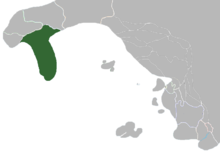Difference between revisions of "Sibaria"
| Line 86: | Line 86: | ||
|GDP_PPP_per_capita = | |GDP_PPP_per_capita = | ||
|GDP_PPP_per_capita_rank = | |GDP_PPP_per_capita_rank = | ||
| − | |GDP_nominal = | + | |GDP_nominal = 7.21 trillion |
|GDP_nominal_rank = | |GDP_nominal_rank = | ||
| − | |GDP_nominal_year = | + | |GDP_nominal_year = 2028 |
|GDP_nominal_per_capita = | |GDP_nominal_per_capita = | ||
|GDP_nominal_per_capita_rank = | |GDP_nominal_per_capita_rank = | ||
| − | |Gini = | + | |Gini = 36.9 |
|Gini_ref = <!--(for any ref/s to associate with Gini number)--> | |Gini_ref = <!--(for any ref/s to associate with Gini number)--> | ||
|Gini_rank = | |Gini_rank = | ||
|Gini_year = | |Gini_year = | ||
| − | |HDI = | + | |HDI = 0.91 |
|HDI_ref = <!--(for any ref/s to associate with HDI number)--> | |HDI_ref = <!--(for any ref/s to associate with HDI number)--> | ||
|HDI_rank = | |HDI_rank = | ||
|HDI_year = | |HDI_year = | ||
| − | |currency = Pyvzik | + | |currency = [[Pyvzik|Sibarian Pyvzik]] |
|currency_code = PYV | |currency_code = PYV | ||
|time_zone = SNTS | |time_zone = SNTS | ||
Revision as of 22:18, 11 March 2016
| This page is a work in progress by its author(s) and should not be considered final. |
| The Sibarian Federation | |||||
|---|---|---|---|---|---|
|
|||||
| Motto: For our people | |||||
| Anthem: The State anthem of Sibaria | |||||
Map of Sibaria in Moneylania
|
|||||
| Capital | Vladivastak | ||||
| Largest | Petrevich | ||||
| Official languages | Sibarian, English | ||||
| Recognised national languages | Platacian, Xianuanise | ||||
| Ethnic groups (2025) | Sibarian, Platacian, Xianuanise | ||||
| Demonym | Sibarian | ||||
| Government | Federal parliamentary constitutional monarchy | ||||
| - | Head of State | Redovan Stojanovic | |||
| - | Prime Minister | Pyotr Toskiy | |||
| Indpependent | |||||
| - | Ancient empire | 3,000 BC | |||
| - | Formation of modern Sibarian states | 725 | |||
| - | Formation of Sibarian Empire | 1066 | |||
| - | Formation of USSR | 1921 | |||
| Area | |||||
| - | 804,060 km2 310,449 sq mi |
||||
| Population | |||||
| - | 2026 estimate | 230,000,000 | |||
| - | Density | 20/km2 51.8/sq mi |
|||
| GDP (nominal) | 2028 estimate | ||||
| - | Total | 7.21 trillion | |||
| Gini | 36.9 medium |
||||
| HDI | 0.91 very high |
||||
| Currency | Sibarian Pyvzik (PYV) |
||||
| Time zone | SNTS | ||||
| Date format | dd-mm-yyyy | ||||
| Drives on the | left | ||||
| Calling code | +2 | ||||
| Internet TLD | .sb | ||||
Sibaria (/S-eye bá'ría/ Sibarian: Сибирь) officialy The Sibarian Federation is a nation in Greater Moneylania, situated in the region known as Asumiqe. Sibaria is the largest nation in Moneylania at 804,060 km2. It borders D'nalop and Berkraine to the west and Reznovistan to the north-east. Sibaria is known for its technological advancements and is also known for the "Only in Sibaria" internet phenomena.
Tribes in the Sibarian region combined into an empire around early 3000 BC. They then disolved in 1066, the start of the Medieval Era in Moneylania. The Sibarian Empire conqured all of the other kingdoms iin the area, which ended in 1345, at the Battle of Devonic Pine. Kings and queens ruled The Sibarian Empire until the late the early 1900's, when a communist revloution at the hand of Dorofei Yakovlev took over the monarchy and proclaimed himself head of state.
It is difficult to tell where the omnipresent, moralistic, socially-minded government stops and the rest of society begins, but it is effectively ruled by the Department of Law & Order, with areas such as Social Welfare and Religion & Spirituality receiving almost no funds by comparison. The average income tax rate is 47%, but much higher for the wealthy.
Crime is well under control, thanks to the all-pervasive police force. Sibaria's national animal is the Emu, which frolics freely in the nation's many lush forests, and its currency is the Sibarian Pyvzik.



